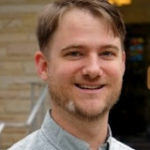
Dearest Laila,
Just over a month ago, you joined us here on land, and we couldn’t have been more excited and grateful to meet you. You are too young to read this right now — your curious eyes are just learning to search out the contrasts between light and dark, fascinated by the black rim of the nursery mirror where it meets the white wall.
I have been thinking over these past few weeks about the things I hope you will know as you grow older. There are too many to write down all in one place, but I thought I would try, incomplete as the attempt might be. It’s what I do, you see. You’ll learn that about your father, for better or for worse. I hope it will mainly be for the better.
I hope you will know that you are so, so loved. That I love you and your mom loves you and your grandparents love you and so many other people love you, and that God loves you and knows you by your name. You will always be loved. Nothing and nobody can take that away.
I hope you will know that it is ok to have big, big feelings. People in our family often do. Feelings aren’t bad. They’re how our hearts talk to us about the world. Sometimes, they try to tell us too much all at once, and we have to sit down with them and tell them to raise their hands and speak one at a time, but that’s not because they are bad. It’s because they have so much to tell us.
I hope you will know that when your dad has big, big feelings, it’s not bad. And it’s certainly not because you are bad or have done anything bad. You, my love, are so, so good. Sometimes, when your dad seems sad, or mad, or hurt, it’s because his heart and his brain are trying to tell him too many things all at once. He is still learning how to sit down with them and talk to them. Your dad is still learning to see, not just the contrasts between the extremes, which your eyes are right now practicing on, but all the shades of in-betweens. And that can be hard. And it’s ok to tell your dad that it’s hard. It’s all ok, because we are all learning, all the time.
I hope you will know that brains are complex and sometimes hard but they are beautiful as well. I hope you will know that our minds and our hearts and our souls and our bodies are good, and that they are made to love and be loved.
I hope you will know that you are safe and that you are cared for. I hope you will know that your mom and I try to do everything we can to make the world a better place, not just for you, but for all of the friends and neighbors you will make as you grow up.
I hope you will know who you are. I also hope you will know that figuring out who we are is the journey of a lifetime. I hope you will know that the things you love and are fascinated by are part of that journey.
I hope you will know that there is something in this world that only you can do and be, and that when the time comes, you will have everything you need to do and be it.
I hope you will know joy, and know how much more joyful it becomes when shared.
I hope you know that since your first breath you have always made me laugh, and smile, and cry the best kind of tears.
I hope you will know how strong and amazing your mom is. I hope you will know how strong and amazing you are.
And most of all, I hope you will know whatever you need to know, whatever you want to know, whatever knowledge and wonder your already-so-curious mind seeks out. Right now it’s the contrasts between light and dark, the source of the glimmering lights on our Christmas tree, the way your startlingly strong little hands work, the identity of the strange furry canine who is so curious about you as well. Who knows what it will be next?
Who knows?
I hope you will know.
I love you. You are so, so, loved.
Gratefully,
Your Dad

David Finnegan-Hosey
David Finnegan-Hosey is the author of Christ on the Psych Ward and Grace is a Pre-Existing Condition: Faith, Systems, and Mental Healthcare. He serves as College Chaplain and Director of Campus Ministries at Barton College. He holds an M.Div from Wesley Theological Seminary and a unit of Clinical Pastoral Education from the National Institutes of Health Clinical Center. He is certified by Mental Health First Aid USA to provide initial help to people experiencing depression, anxiety, psychosis, and substance use disorders. In 2011, David was diagnosed with bipolar disorder after a series of psychiatric hospitalizations. He now speaks and writes about the intersections among mental illness, mental health, and faith. David lives in Wilson, NC with his wife Leigh, their daughter Laila, and their dog Penny Lane.